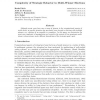47 search results - page 3 / 10 » Controlling Candidate-Sequential Elections |
DC
2007
13 years 5 months ago
2007
d bins abstraction and works in two phases. The main novelty of the work is in the first phase where the number of contending processes is reduced in a controlled manner. Probabil...
ATAL
2008
Springer
13 years 7 months ago
2008
Springer
Recent work by Procaccia, Rosenschein and Zohar [14] established some results regarding the complexity of manipulation and control in elections with multiple winners, such as elec...
JAIR
2008
13 years 5 months ago
2008
Although recent years have seen a surge of interest in the computational aspects of social choice, no specific attention has previously been devoted to elections with multiple win...
AAAI
2008
13 years 7 months ago
2008
In this paper, we set up a framework to study approximation of manipulation, control, and bribery in elections. We show existence of approximation algorithms (even fully polynomia...
AAAI
2010
13 years 3 months ago
2010
We consider the problem of manipulating elections via cloning candidates. In our model, a manipulator can replace each candidate c by one or more clones, i.e., new candidates that...

